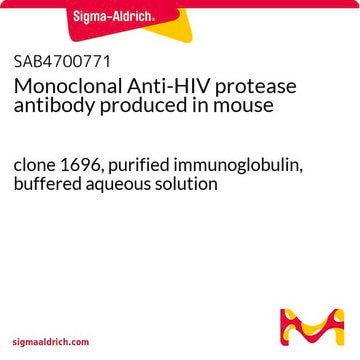H3784
HEPES sodium salt
BioPerformance Certified, suitable for cell culture, ≥99.0%
Sinónimos:
4-(2-Hydroxyethyl)piperazine-1-ethanesulfonic acid sodium salt, N-(2-Hydroxyethyl)piperazine-N′-(2-ethanesulfonic acid) sodium salt
About This Item
Productos recomendados
grado
BioPerformance Certified
Nivel de calidad
Análisis
≥99.0%
formulario
powder
condiciones de almacenamiento
dry at room temperature
técnicas
activity assay: suitable
cell culture | mammalian: suitable
impurezas
endotoxin and total aerobic microbial count, tested
color
white
pH
10-12 (1 M in water)
intervalo de pH útil
6.8-8.2
pKa (25 °C)
7.5
solubilidad
water: 0.1 M, clear, colorless
densidad
1.19 g/cm3 at 20—25 °C
1.21 g/cm3 at 20—25 °C
absorción
≤0.02 at 280 in H2O at 0.1 M
≤0.04 at 260 in H2O at 0.1 M
idoneidad
suitable for component for culture media
suitable for molecular biology
aplicaciones
cell analysis
diagnostic assay manufacturing
general analytical
life science and biopharma
actividad extraña
DNase, RNase, NICKase, protease, none detected
cadena SMILES
[Na+].OCCN1CCN(CC1)CCS([O-])(=O)=O
InChI
1S/C8H18N2O4S.Na/c11-7-5-9-1-3-10(4-2-9)6-8-15(12,13)14;/h11H,1-8H2,(H,12,13,14);/q;+1/p-1
Clave InChI
RDZTWEVXRGYCFV-UHFFFAOYSA-M
¿Está buscando productos similares? Visita Guía de comparación de productos
Categorías relacionadas
Descripción general
In cell culture, HEPES excels in maintaining stable physiological pH even amidst fluctuating carbon dioxide concentrations, outperforming bicarbonate buffers (NaHCO3). Moreover, HEPES showcases valuable properties in various biological and biochemical processes, such as isoelectric focusing for protein separation and minimal interference in DNA-restriction enzyme reactions, making it indispensable across diverse research applications, including immunoprecipitation, cell lysis, and live cell imaging. Its versatility, exceptional buffering capacity, and minimal interaction with molecules establish HEPES as a key tool in various research domains.
Aplicación
- to supplement the HSOF medium
- as a buffer component of HCZB medium in egg and embryo culture
- as a buffer component in cell culture
Características y beneficios
- High-purity product for biochemical and biological research
- Tested to confirm low levels of heavy metal contamination, ensuring suitability for various applications
- Highly soluble in water with a useful pH range of 6.8 - 8.2 and pKa of 7.5 at 25 °C
- Suitable for Cell culture
- Tested for Endotoxins and Total Aerobic Microbial Count
- Free from DNase, NICKase, RNase, Endonuclease, Exonuclease and Protease
Forma física
Otras notas
producto comparable
Código de clase de almacenamiento
11 - Combustible Solids
Clase de riesgo para el agua (WGK)
WGK 3
Punto de inflamabilidad (°F)
Not applicable
Punto de inflamabilidad (°C)
Not applicable
Equipo de protección personal
Eyeshields, Gloves, type N95 (US)
Certificados de análisis (COA)
Busque Certificados de análisis (COA) introduciendo el número de lote del producto. Los números de lote se encuentran en la etiqueta del producto después de las palabras «Lot» o «Batch»
¿Ya tiene este producto?
Encuentre la documentación para los productos que ha comprado recientemente en la Biblioteca de documentos.
Los clientes también vieron
Nuestro equipo de científicos tiene experiencia en todas las áreas de investigación: Ciencias de la vida, Ciencia de los materiales, Síntesis química, Cromatografía, Analítica y muchas otras.
Póngase en contacto con el Servicio técnico

